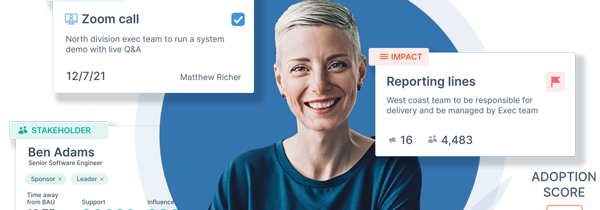Culture and Change
Does your organization factor culture into its change plans?
This module explains the critical importance of understanding and factoring-in an organization’s unique culture during change initiatives. Outlines what elements combine to form organizational culture, demonstrates how change leaders vary their approach to suit organizations with differing cultures. The influence of national cultures is also explored with an explanation of models that assist multi-regional change initiatives.
BUY THIS WORKSHOP TRAINING MODULE
INCLUDES
12 page facilitator guide
4 engaging training activities
35 slide presentation deck
04:30 min summary video
8 handouts
6 resources in reading guide
$495.00
has been added to your cart!
have been added to your cart!
30 DAY GUARANTEE
Materials included
Summary Video
DURATION: 04:30 MINS
Explains concepts in a concise, memorable manner. Includes a bulleted summary at the conclusion and matching job-aid handout PDF.
Facilitation Guide
PAGES: 12
Comprehensive yet easy-to-follow instructions for facilitating workshops with the above training activities. Includes useful tips and sample answers to questions. No expertise in the topic area is required.
Presentation Slide Deck
SLIDES: 35
For use during workshops in both PDF & editable PPT formats. Slide numbers for each activity are referenced in the Facilitation Guide.
Reading Guide
RESOURCES LISTED: 6
Useful for participants wishing to deep dive into the module topic with links to the web's best articles, books and tools. PDF format.
Activity Handouts
Everything you need to facilitate successful training activities.
- Commitment to change postcards
- Cultural Analysis Worksheet (extended version 4 pages)
- Cultural Analysis Worksheet (simple version)
- Elements of Culture (Flashcards)
- Job-aid summary
- Terminology flash cards
- Types of Change poster (4 pages)
Tools & Templates
Used during training activities. These can also be used for change implementation.
- Cultural analysis template
Benefits
This module will activate your organization to:
- help organizational members to understand what features of an organization interact to form the emerging property of its culture, and prompt them to recognize these varied features in their organization
- clarify the distinction between change initiatives that consider an organization’s culture and those that attempt to influence the organization’s culture
- demonstrate to senior leaders who have the ambition to promote cultural change within an organization the ongoing commitment and support required to achieve sustained cultural change
- understand how a change team would alter their approach to a change initiative based on the cultural differences between two otherwise similar organizations
- to demonstrate the need of multinational organizations to adapt and customize a change implementation plan to local conditions due to national cultural differences
- The module can act as a primer before a cultural inventorying assessment is undertaken in order to demonstrate the need to understand the nature of the organization’s unique culture
This module will empower your teams and individuals to:
- understand the nature of the elements that combine to constitute an organization’s culture
- awareness that there may be distinct inter-organizational cultures that can impact upon a change initiative
- recognize the strong link between organizational culture and change initiative success
- be aware how differences in organizational cultures can result in concrete differences in change implementation plans
- acknowledge the various metrics for inventorying organizational culture
This module is ideal for use at this stage of change implementation:
| Pre-implementation | During Implementation | Post-implementation |
Training Activities
Summary Video & Discussion
TARGET AUDIENCE: All learners SUGGESTED TIMING: 15 - 30 minutes
The module subject-matter is introduced using a short animated video. The knowledge-check and personal reflections questions are then used to explore learners’ understanding and experience before moving on to other connected activities.
Facilitators can make use of a range of techniques such as brainstorming or debates to explore the knowledge check questions.
Use examples of learners’ experiences in the supplementary activity which follows.
The Elements of Culture
TARGET AUDIENCE: All learners SUGGESTED TIMING: 30 - 45 minutes
This activity helps learners develop a deeper understanding of the different elements of organizational culture. Using brainstorming or mind mapping techniques, they put down examples of the different elements which make up an organization’s culture.
Cultural Analysis
TARGET AUDIENCE: All learners SUGGESTED TIMING: 30 - 45 minutes
This activity takes learners through an analysis of the culture of their organization. It builds upon the cultural elements explored in the previous activity. If learners are from different organizations, they should work individually. However, it is often preferable if they can work in groups which have a shared experience of a particular culture.
Culture Change Plan
TARGET AUDIENCE: Executives, experienced change agents, sponsors SUGGESTED TIMING: 30 - 45 minutes
This builds on the work done in the previous activity and is suitable for experienced learners and people in senior positions. Culture change is a long-term ambition and a difficult one to achieve. However, with commitment from the leaders of an organization this ambition can be realized over time.
Compatibility Guide
This module will boost engagement levels during the following change methodology stages:
| Change Management Methodology | Stage / phase |
| AIM (Accelerated Implementation Methodology) | Develop Reinforcement Strategy |
| Kurt Lewin’s Three Stage Change Model | Refreeze: Anchor the changes into the culture |
| Bridges Leading Transition Model for Change | New Beginnings: Symbolize new identity |
| Beckhard and Harris Change Management Process | Consolidating |
| John Kotter Eight Step Model for Change | Incorporating Changes into the Culture |
| ADKAR Model for Change Management | Reinforcement |
| Kubler Ross Change Curve Model | |
| LaMarsh Change Management Model | Sustain the Change |
| People Centered Implementation (PCI) Model | Sustained Personal Performance |
| Viral Change Roadmap Model | Sustain |
| General Electric Change Acceleration Process (CAP) | Making change last |
